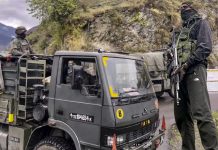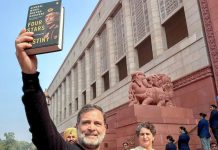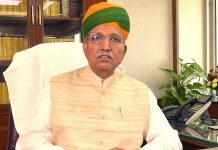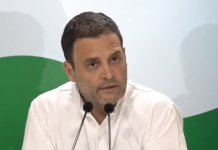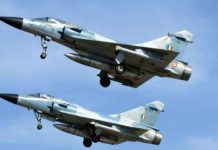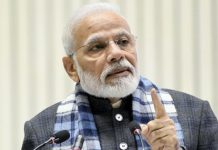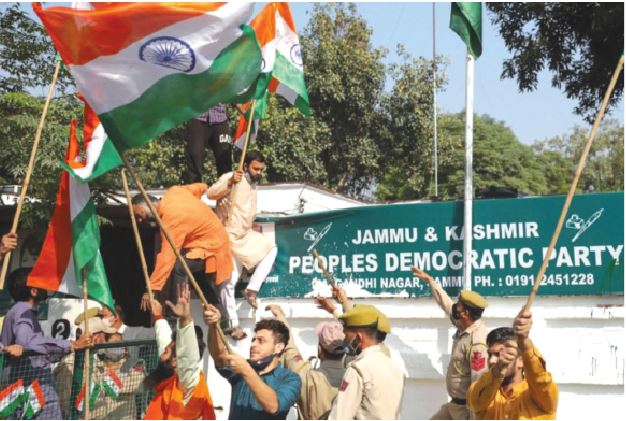
Two years after revocation of Article 370, Kashmir is far from reconciled to the loss of autonomy, reports RIYAZ WANI
On August 5, Jammu and Kashmir observed the second anniversary of the rescinding of Article 370 that granted the former state its autonomous status within Indian Union. The BJP celebrated the occasion by holding Tiranga rallies and hoisting the national flag across the union territory.
BJP national general secretary Tarun Chugh, who is also the party affairs in charge for the union territories of J&K and Ladakh, celebrated the day by cutting a cake at a function in Srinagar. Addressing the party workers, he said, one of the more significant achievements of the 2019 decision was that “it dealt a big blow to the divisive and terrorist forces”.
But the other major J&K parties including National Conference, the PDP, the Congress, the People’s Conference, and some smaller Kashmir-based parties once again protested the repeal of Article 370.
The National Conference chief and Member of Parliament Dr. Farooq Abdullah said that his party’s position on the unilateral, unconstitutional, and undemocratic decisions taken on August 5, 2019, would never change.
Addressing a meeting of party functionaries at the party’s headquarters in Srinagar. Dr. Abdullah said that the August 5 decision was a lethal assault on the country’s secular character, its pluralistic and asymmetrical federalism and the violation of sovereign promises made by the country to the people of Jammu, Kashmir, and Ladakh.
In Srinagar, the PDP president Mehbooba Mufti led a protest march of the party workers who were wearing black bands. They shouted slogans against the August 5, 2019 move and in favour of a “resolution of the Kashmir issue”. The protesters were, however, stopped by police after some distance and forced to turn back.
Later speaking to reporters, Mehbooba said August 5 was a day of mourning for J&K. The party observed it as a “black day” for people of the union territory.
“It is unfortunate that the BJP is celebrating across the country, while Kashmir is mourning,” she said adding that the survival of the people of J&K depends on the restoration of their constitutional rights.
“We will together restore our constitutional position and then resolve the Kashmir issue by forcing the Government of India to talk to the people of J&K to address the internal dimension,” and talk with Pakistan as well to address the external dimension,” she said while calling on the BJP to reverse the decisions taken on August 5, 2019.
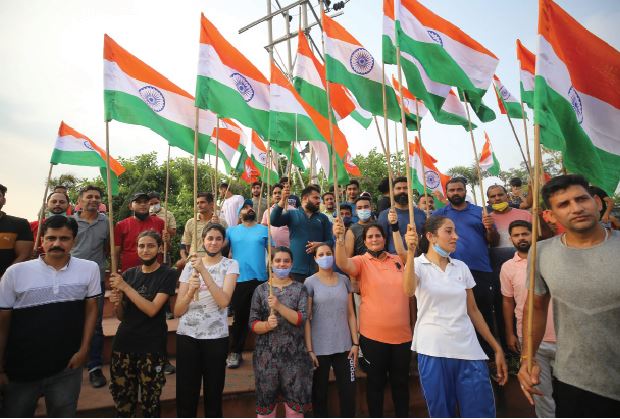
“There is no other option. The centre is already talking to Pakistan which resulted in the ceasefire. This, in turn, has resulted in decline in infiltration,” she added
Mehbooba reiterated her party’s long-standing position that J&K should become a bridge of peace between India and Pakistan.
Similarly, People’s Conference led by Sajjad Gani Lone, which otherwise is seen to have a more nuanced approach towards revocation of Article 370 said the August 5 will be remembered as a “day of disempowerment” in the history of Jammu and Kashmir.
“August 5th is seen as a day of disempowerment, a reminder of the humiliation that the people of Jammu and Kashmir were subjected to,” Adnan Ashraf Mir, the spokesperson of the party said. “These decisions contravene the very ideas of justice and dignity that form the core of the political system and constitutional philosophy of the Republic of India.”
Ladakh reaction
In Ladakh too, August 5 was not an occasion to celebrate. On the contrary, the political parties from its two districts — Leh and Kargil — which earlier held a markedly divergent view about the repeal of Article 370 came together to demand statehood for the union territory.
The leaders from both districts addressed a joint press conference. Earlier, the Apex Committee of Peoples Movement of Ladakh led by chairperson Thupstan Chhewang and the Kargil Democratic Alliance Co-Chairman Asgar Ali Karbalai held a meeting to forge a political consensus.“We need protection for land and jobs under Article 371 or under the sixth schedule of the Constitution,” Karbalai said. He demanded two parliamentary seats for the region. “We will negotiate with the Union Government around these very issues and demands.”
People in Kargil had opposed the revocation of Article 370 on August 5, 2019, while Leh had welcomed it. Now while Kargil continues to seek restoration of J&K autonomy and undoing of the former state’s bifurcation, it has joined forces with Leh to demand statehood and the special status under Article 371 for Ladakh.
The reason for this is that as a union territory, Ladakhis stare at a perpetual bureaucratic rule under a New Delhi appointed Lieutenant Governor. The Ladakh and Kargil Hill Development Councils which wielded significant power in the undivided semi-autonomous J&K have become non-entities.
Deep alienation
Though an uneasy peace has held in the Valley since August 2019, people are far from reconciling to the loss of autonomy as a fait accompli. They have been watching the unfolding state of affairs silently. There have been fewer protests and far fewer stone-pelting incidents. Hartals have become scarce. But despite these outward manifestations of peace, the Valley is more alienated than ever.
The militancy has suffered a setback but remains very much alive and kicking. About 90 militants have been killed in Kashmir this year so far in encounters with security forces, half of them belonging to Lashkar-e-Toiba. 73 more youth are believed to have picked up gun in.the period. These figures, revealed recently by the Inspector General of Police for Kashmir Vijay Kumar, once again reflect an abiding reality of Kashmir for the past three decades: the simultaneous recruitment of new youth into militant ranks replenishes the depleted militant ranks. And in the end, the number of active militants more or less stays the same.
Geopolitical shift
Things have since become complicated geopolitically too. China’s incursions in Ladakh have made the communist power as yet another party to the issue. And the alleged China-Pakistan collusion in the region has erected what some observers in Kashmir think ‘a great wall of China’ around India on its northern and western side. Also, the emerging cooperation among China, Pakistan, Iran, Russia is giving all indications of the emergence of a geopolitical block. And if all goes well Afghanistan under the Taliban could also be part of this block. Also, India has already withdrawn from China’s Border and Road Initiative. New Delhi, on the contrary, has aligned itself with the US and the west.
These shifting alignments are putting in place a new geopolitical order. This order, however, in no way will help resolve the issues of the subcontinent particularly those between India and Pakistan. Going forward, the situation looks set to become more complicated. Though the signs of thaw between India and Pakistan early this year had offered some hope, it has since fizzled out.
tehelkaletters@gmail.com

